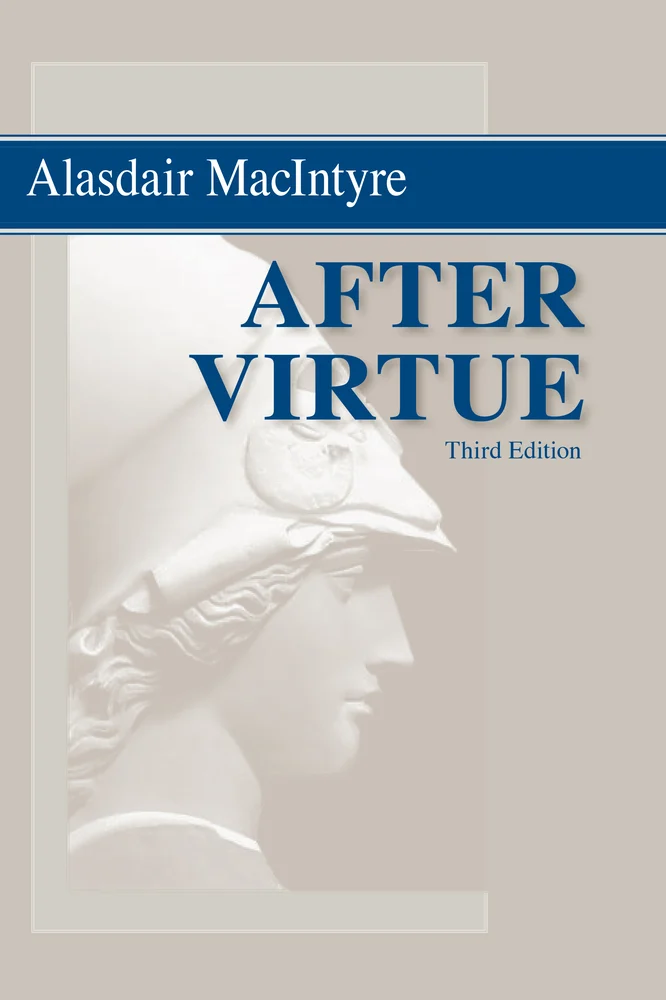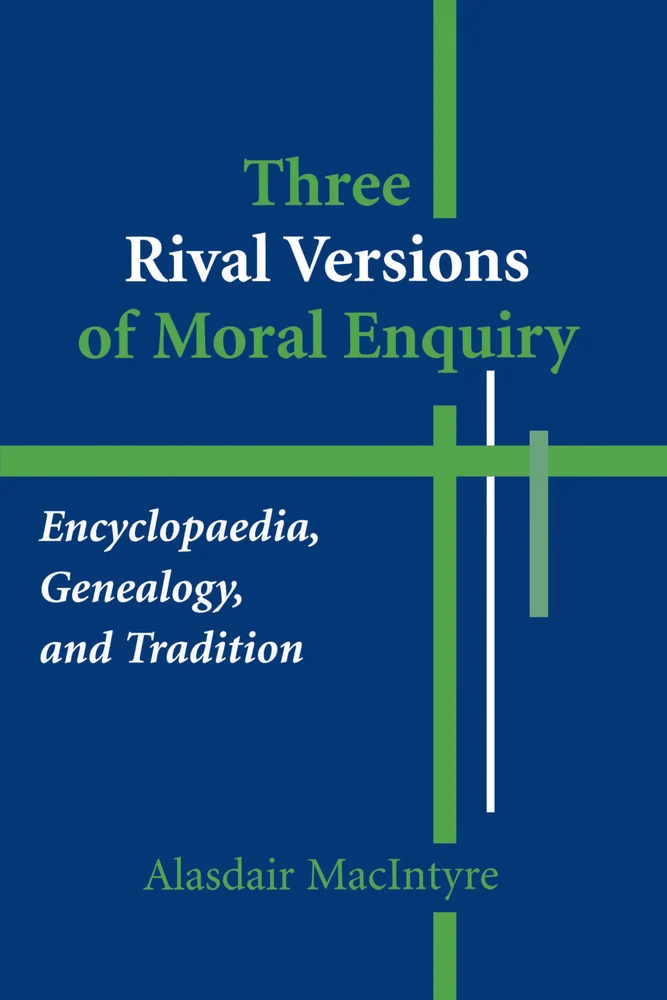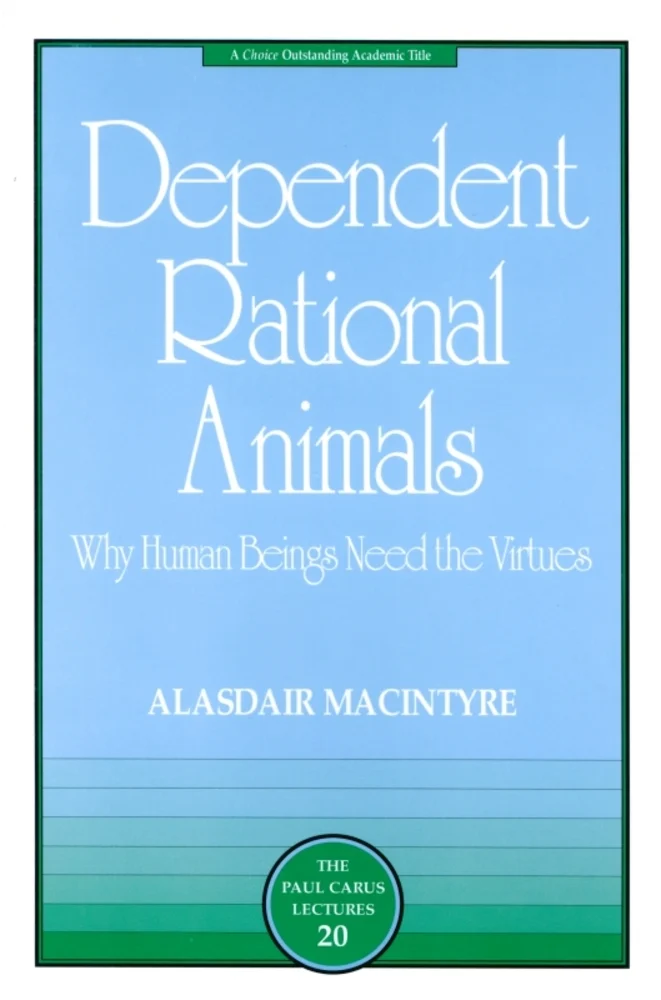The world lost an intellectual giant on May 21st, 2025, when Alasdair MacIntyre passed away at 96 years of age. MacIntyre, whose published books alone number over two dozen, began his career with a decidedly Marxist philosophical bent but by the end of his life had become influential on a generation of students and thinkers associated more with conservatism (an “ism” which MacIntyre, of course, disavowed). His role in attracting interest to virtue ethics in classrooms and scholarship could likely not be overstated. It would accordingly be impossible to do justice to such wide-ranging and heavy-hitting writings in mere summary, particularly a summary by a non-philosopher such as myself. Instead, allow me to offer more of a personal reflection, and to beg the reader’s forgiveness if I in some way misrepresent his thought.
When I first heard the name “Alasdair MacIntyre,” it was spoken in reverent tones by upperclassmen who had just finished Dr. Mark T. Mitchell’s class titled, simply, “Virtue.” This class, I learned, combined philosophy and fiction in an intriguing way: students would read dense tomes of moral and political philosophy alongside, for example, the works of Jane Austen. But this pairing was not solely Dr. Mitchell’s doing; I would learn later, when made to read After Virtue in my own coursework, that MacIntyre masterfully wedded his historical philosophical study to an analysis of Austen’s works in a way that has proven influential on everything I have written and taught since.
I would also later learn that MacIntyre was a mentor and an influence on another of my professors, Dr. Roberta Bayer, who completed her dissertation under him at Notre Dame. My recollection may do her accounting injustice, but I recall her telling our class that she came to MacIntyre’s office ready to begin a dissertation on Aquinas, and his response was something like, “Everyone does Aquinas. Do something else.”
This quip sounds characteristic of MacIntyre’s dry responses given in other venues, both recorded and recounted over the years at conferences and paper presentations he continued to give at Notre Dame long after most people’s working lives would have concluded. His voluminous work was matched, apparently, by a generosity with his time that extended to teaching coursework at Notre Dame, again, at a late career stage when many faculty have long since left their students behind. This demonstrates to me, as someone viewing his work at a distance, a man truly pursuing a vocation, a calling as a thinker and philosopher and believer and mentor that encouraged many in their pursuit of truth. This vocation and its influence have been apparent in the outpouring of love since his death by those who knew him well and those like me who only knew him through his words and the words of his students. Though the books stand well enough on their own, I can hardly think of a greater legacy for a teacher and scholar to leave behind.
After Virtue (1981) is certainly MacIntyre’s most widely read work and has been cited so liberally by such a variety of thinkers of all stripes and persuasions that one would be hard-pressed to deny MacIntyre’s status and influence. The precise nature of this influence is and has been contested, most notably, perhaps, when the work’s famous concluding paragraph inspired an “option” named after MacIntyre’s hypothetical new and “doubtless very different St. Benedict.”
But it is MacIntyre’s own prologue to the third edition of After Virtue, published in 2007, that I think provides the best condensation of the book’s place in MacIntyre’s intellectual journey and its status today. As MacIntyre puts it, “When I wrote After Virtue, I was already an Aristotelian, but not yet a Thomist.” The progress in his thought, from Marxist to Aristotelian to Thomist, is interesting on its own, but particularly insofar as MacIntyre saw this development as finding fulfilments or culminations of the truths of each tradition as he gained insight into the next; Marx’s insights are as present in his late Ethics in the Conflicts of Modernity (2016) as they are in his early, more typically “Marxist” work, though filtered, tempered, and refined through his own intellectual development.
After Virtue is perhaps most famous for advancing claims regarding “incommensurability” and “emotivism.” On the latter: MacIntyre argues that in present culture (that is, writing in 1981), “in moral argument the apparent assertion of principles functions as a mask for expressions of personal preference.” In other words, without a coherent conception of the good, moral claims are sometimes nothing more than the equivalent of an emotional claim that does not admit of disagreement: I feel badly about such and such, and so I call it bad. The feeling cannot be contested rationally, and thus the pseudo-moral claim resting on that feeling is not contestable. While MacIntyre says this is descriptively the case in much moral discourse, the emotivist takes a descriptive fact about some moral discourse and claims it to be “universally the case”; that is, “Emotivism… rests upon a claim that every attempt, whether past or present, to provide a rational justification for an objective morality has in fact failed.” This MacIntyre takes to be false, and his work in both After Virtue and after can be seen as a thoroughgoing rebuttal to the theoretical claim of the emotivist.
It is in this discussion of emotivism that After Virtue may feel anachronistic to some contemporary readers. We seem to have lived and be living through an age not of squishy, emotivist claims that “that’s, just, like, your opinion man,” but rather a dogmatic age where moral claims are seriously made and rigorously enforced. Such claims about the dogmatic character of secular morality have been advanced, for example, in Mark T. Mitchell’s Power and Purity and Joshua Mitchell’s American Awakening, among other works.
On “incommensurability,” MacIntyre provides three practical examples of opposing premises on issues of political concern: war, abortion, and government provision of public goods. After laying out opposing premises by topic, he explains, “In the first argument [war] for example, premises which invoke justice and innocence are at odds with premises which invoke success and survival; in the second [abortion], premises which invoke rights are at odds with those which invoke universalizability; in the third [government services] it is the claim of equality that is matched against that of liberty.” Each of these opposing premises is founded on “incommensurable” moral claims which makes political discussion “interminable.”
What it means for these for these arguments to be “incommensurable” is given literary light through the book’s famous opening anecdote, borrowed as a summary of Walter M. Miller Jr.’s classic science fiction novel A Canticle for Liebowitz. “Imagine,” MacIntyre writes, “that the natural sciences were to suffer the effects of a catastrophe” that obliterated science and learning as we know it, burning books, banning teaching, purging records, and the like. “Later still there is a reaction against this destructive movement and enlightened people seek to revive science, although they have largely forgotten what it was. But all that they possess are fragments,” words and phrases and bits of information disconnected from the theoretical disciplines which gave them coherence.
People in such a situation would retain elements of specialist vocabulary, and perhaps even enter into vigorous debates about “the respective merits of relativity theory, evolutionary theory, phlogiston theory,” and so on, without any agreed-upon way to resolve these disagreements. “What would appear to be rival and competing premises for which no further argument could be given would abound.” This, MacIntyre says, is the state of moral discourse in the real, not science fictional, world. We have fragmentary words and phrases, competing definitions of things like “virtue,” and no easy way to resolve those differences, no agreed-upon “neutral” standard of rationality that can settle who is right and who is wrong.
Lest the reader lapse into a kind of pessimistic relativism, MacIntyre’s preface to After Virtue once again here offers insight: “a necessary first step” for those attempting to adjudicate between competing traditions “would be for them to come to understand what it is to think in the terms prescribed by that particular rival tradition, to learn how to think as if one were a convinced adherent of that rival tradition.” This intellectual practice is certainly a difficult one, yet one I try to inculcate in my students in our attempts to read texts from people outside our own faith tradition with charity and understanding before critique.
In that process of understanding a rival tradition, it may become clear that there are tensions, failings, and problems internal to it, problems that may only be resolvable “from the standpoint of some rival tradition.” In fact, it may ultimately be the case that “one such tradition” can “defeat another,” or perhaps all others, “in respect of the adequacy of its claims to truth and to rational justification.” What precisely this project of competitive wrestling between traditions looks like is best spelled out by MacIntyre himself in the pages of his later works, particularly Whose Justice? Which Rationality? (1988) and Three Rival Versions of Moral Enquiry (1990).
If I may sound a somewhat critical note, I have heard it said (though where, I cannot recall) that MacIntyre is an exceptional thinker, but occasionally a poor reader. As a sometime scholar of the Scottish Enlightenment, for example, I find MacIntyre’s treatment of Adam Smith and related thinkers as a bit narrow and uncharitable at best. MacIntyre’s interpretation of Kierkegaard, to give another example, was so hotly contested that it resulted in a rich edited volume Kierkegaard After MacIntyre, where contributors argue that Kierkegaard may be an ally rather than a foe in MacIntyre’s broader project (MacIntyre, for his part, seemed unmoved). But even here, where we might perhaps accuse MacIntyre of a failing of scholarship or historical rigor, we see his effectiveness as a thinker. If MacIntyre’s criticisms of Smith and Hume lay unaddressed and unrebutted, the failing is ours in not addressing and rebutting him if we think he is incorrect. If MacIntyre’s criticisms of Kierkegaard inspire great works of Kierkegaard scholarship, if Kierkegaard and others can thus be resuscitated against criticisms and employed in our project of traditional moral enquiry, all the better, in my view.
Though After Virtue tops the recommended reading lists of many, it was MacIntyre’s later Dependent Rational Animals (1999) that has stayed most embedded in my thinking and made its way into much of my work. Compare the best life offered to us by Aristotle to the life most of us lead: Aristotle seems to suggest that a life free of dependence on material concerns or political obligations, spent pursuing the activity of rational contemplation, is happiest, as it is the least dependent, in other words the most independent, and thus the most choiceworthy. The unhappy lives by contrast are those lived fully dependently, say the life of a slave or someone who toils merely to satisfy physical needs. But it is a simple fact, MacIntyre argues, that:
It is most often to others that we owe our survival, let alone our flourishing, as we encounter bodily illness and injury, inadequate nutrition, mental defect and disturbance, and human aggression and neglect. This dependence on particular others for protection and sustenance is most obvious in early childhood and in old age. But between these first and last stages our lives are characteristically marked by longer or shorter periods of injury, illness or other disablement, and some among us are disabled for their entire lives.
MacIntyre continues that we ought not view the “disabled” dependent as a separate “class,” recipients of the benevolence offered by we independent rational agents. Instead, we must realize that in order to become who we are, in order to develop into an independent rational being, we had first to be dependent, we might again be dependent, we, in fact, are dependent on others for our mere survival, not to mention our flourishing.
This has profound implications not just for our own self-estimation and not just for how we feel toward and treat those in various states of dependence. It also becomes an important political measuring stick: Well-functioning, flourishing political communities will be those which create the conditions where people can best develop the virtues appropriate to living both their independent reasoning lives and vulnerable, dependent lives. A properly ordered political community, in other words, is for the good of all people, not just the “ideal” type of independent reasoning human, for “those who benefit from the communal flourishing will include those least capable of practical reasoning, the very young and the very old, the sick, the injured, and the otherwise disabled, and their individual flourishing will be an important index of the flourishing of the whole community.”
When those with these various attributes and afflictions are discarded, when they are struggling, when they are seeking relief in the form of death by their own hands or the hands of others, our “index of the flourishing of the whole community” suggests something terrible is amiss. It does not seem a stretch to take MacIntyre’s work in Dependent Rational Animals as providing intellectual tools with which to diagnose our current failing political communities. When nearly 5% of total yearly deaths in a North American liberal democracy are the result of physician assisted suicide, when suicide rates are rising, these suggest we are being ill-equipped to function well in our dependence.
As an amateur, then, let me offer a concluding recommendation: if you, like many, know MacIntyre primarily through his work in After Virtue, continue to make your way through his other writings. As he writes in his prologue, his later work allowed him to “reconsider and to extend the enquiries” that After Virtue begins. Whose Justice? Which Rationality? and Three Rival Versions of Moral Enquiry continue the conversation and extend the argument, but in my estimation, Dependent Rational Animals offers both a satisfying philosophical exclamation point and a sorely needed ethical and political vision appropriate for the struggles of our own day. As it was in 1981, as it was in 2007, so it is today: “Ours too is a time of waiting for new and unpredictable possibilities of renewal. It is also a time for resisting as prudently and courageously and justly and temperately as possible the dominant social, economic, and political order of advanced modernity.”








